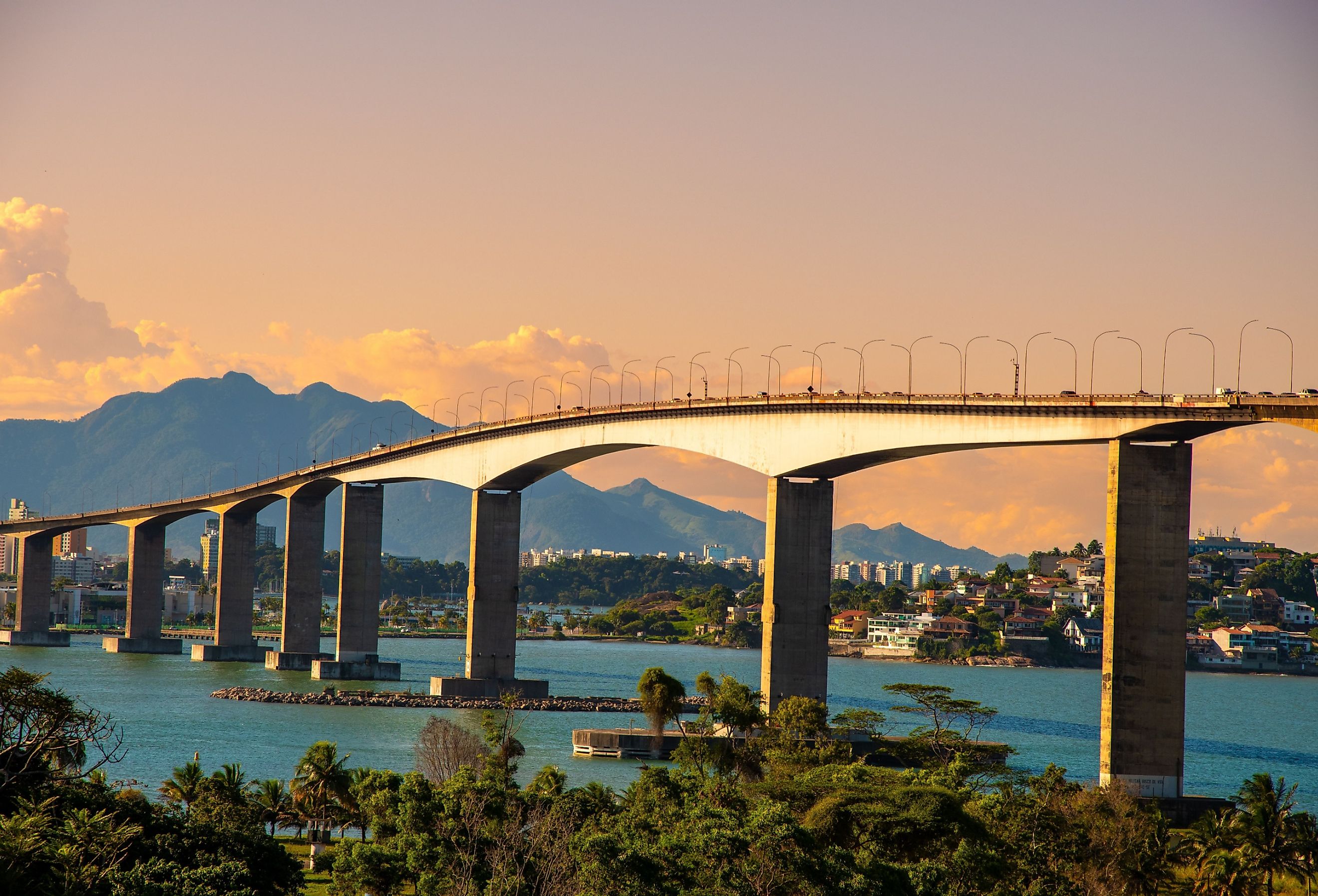
11 Longest Bridges in South America
Bridges are unique structures that can sweep one off one's feet at every glance. They are always a wonder, from the old Greek bridges to modern international bridges. Bridges should be added to the list of wonders of the world because they are genuinely breathtaking, man-made sights. They exist in different forms, lengths, and widths and exist on every continent. Some could be so long that they connect the north to the southern part of a country. Beyond the geographical connections, they also connect the lifestyles and traditions of different cities. South America has a lot of bridges, and these are the eleven longest.
1. Lima Metro Line 1 - 20.5 miles

Lima Metro Line 1 is the longest railway bridge in South America. With a total length of about 34 kilometers, the metro line is one of four long metro lines in Peru, with plans for two more. The Lima Metro Line 1 serves 26 train stations. Sixteen (16) of these stations are slightly elevated, while the other ten (10) are fully elevated—tourists who want to travel and see sights can take train rides from Villa el Salvador to Bayóvar. Construction began in 1986, but regular train service did not resume until 2012. For those ready for a train ride and would like to see the fantastic sights of Lima, pack some bags and hop on any of the trains on Lima’s Metro Line 1.
2. Rio–Niterói Bridge - 8.27 miles
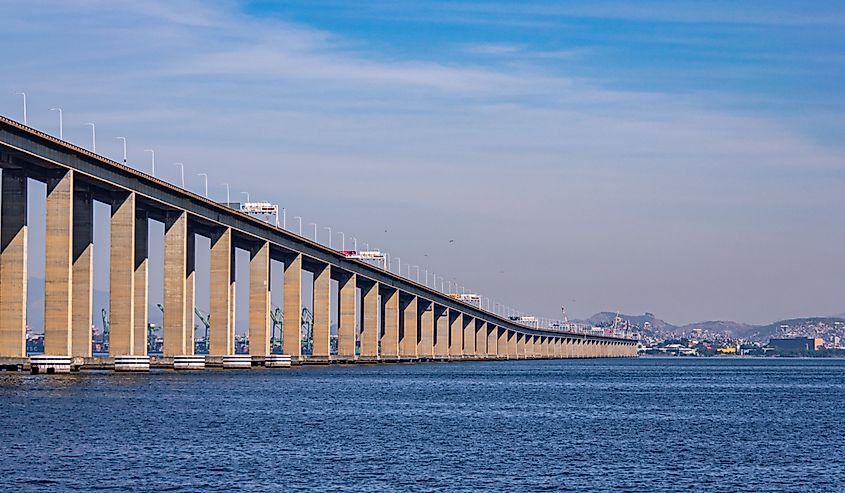
Head over to Brazil to see what is undoubtedly the longest road bridge in South America, the Rio-Niterói Bridge. It was constructed between 1968 and 1974, and at the time, it ranked as the second-longest bridge in the world. With over 13 kilometers, this bridge now ranks first in Brazil, second in South America, and forty-eighth (48th) worldwide. The Rio-Niterói Bridge, as its name implies, links two major cities in Rio de Janeiro: Rio and Niterói. The bridge is constructed in a way that allows its central part to be high enough (up to 72 meters) to accommodate the passage of ships into and from Guanabara Bay. Tourists also pay for ferries that take them from one side of the bridge to the other. This trip gives them a good view of Rio and Brazil's oil rigs. This box-girder bridge, carrying well over 100,000 vehicles daily, is one of the world's longest expressway and box-girder bridges.
3. Rosario-Victoria Bridge - 7.64 miles

In the wheat-producing country of Argentina lies its longest bridge. The Rosario-Victoria Bridge, as its name implies, is a significant link between the cities of Rosario and Victoria. Stretching across the Paranà River, this bridge is not just one bridge but a link of bridges and viaducts with a total length of over twelve (12) kilometers. Work started on the bridge in 1988, but was not opened to the public until 2003 due to inadequate funding. Tourists that would like to see the beauty of the river or have the experience of a cable-stayed bridge could take a ride across the bridge. Others may want to move from Rosario to Victoria; the bridge provides a fantastic link between both states.
4. General Rafael Urdaneta Bridge - 5.4 miles

To look at the fourth-longest bridge in South America, one would have to travel nearly 5,000 kilometers to the west. This beautiful bridge can be seen across Lake Maracaibo and links the city of Maracaibo with other parts of the country. The plan to build the bridge began in 1957, but the bridge was not opened until five (5) years later. This bridge is quite famous because it was built by many construction companies. It was then named after General Rafael Urdaneta, a Venezuelan general who once ruled the nation and fought for its independence. The expressway bridge covers a whopping 8.7 kilometers long and seventeen (17) meters in width. The bridge is also built high enough to allow the passage of boats and small ships. Tourists going to Maracaibo from cities like Cabimas and Puerto Cabello must travel through this connecting wonder to reach their destination.
5. Libertador General San Martín Bridge - 3.36 miles

Number five on the list is a jaw-dropping bridge connecting two countries. Libertador General San Martín Bridge connects Argentina to Uruguay. Spanning a length of 5.4 kilometers, this fantastic bridge carries roads directly linking Puerto Unzué in Argentina to Fray Bentos in Uruguay. Its construction took just over four (4) years, and the streets have been functional since 1976. The construction of the cantilever bridge cost over $21 million during this time. It was named after the famous José de San Martín.
Libertador General San Martin Bridge is one of the most popular travel routes for tourists looking to move from Argentina to Uruguay or the other way. Either way, the bridge provides access to the fascinating scenery of the Uruguay River, and tourists are welcome to take a look at the beautiful landscape scenery from the bridge. Take pictures from the car or park by the road to glimpse the fantastic atmosphere.
6. Viaducto Del Manglar - 3.3 miles
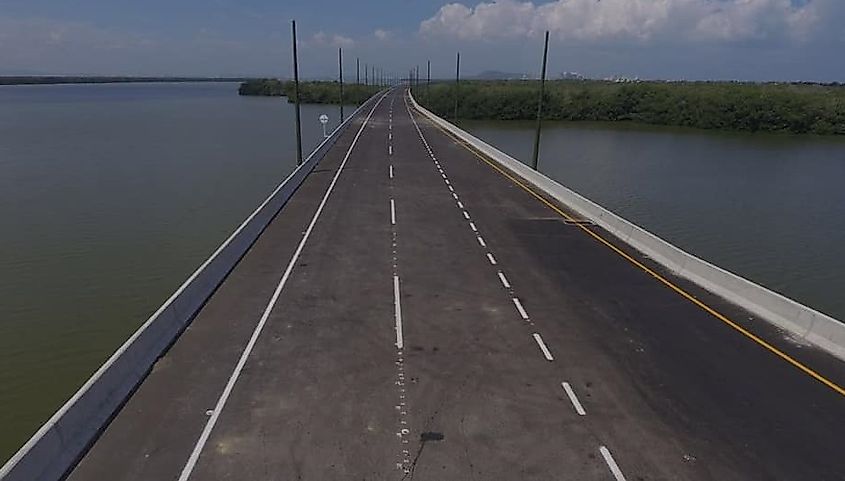
To see the sixth-longest bridge in South America, head to northern Colombia. Connecting the two big cities is the Viaducto Del Manglar. This viaduct is a 3.4-kilometer construction that was built over sea and freshwater. It was made to link Barranquilla's commercial city to Cartagena's resort city, a perfect tourist destination. Both towns are very close to the sea, hence the need to construct a viaduct. The viaduct ranks as the third-longest viaduct in Latin America and the first in Colombia. Cartagena has many beaches, islands, and museums, like the Museum de Indias and the Rosario Islands. As such, it welcomes thousands of tourists every year. The Viaducto Del Manglar is a ready pathway for them to travel through and behold the fantastic sights of Colombia.
7. Rodoferroviária Rollemberg-Vuolo Bridge - 2.3 miles

The next wonder on the list goes back to Brazil. Only a marvel of a bridge can be designed to accommodate vehicles and trains simultaneously. That is precisely the case with the Rodoferroviária Rollemberg-Vuolo Bridge. This 3.7-kilometer-long bridge was built to connect the states of Mato Grosso do Sul and São Paulo. It stretches across the Paranà River. Construction began in 1991, and it was opened in 1998. The bridge was named after two Brazilian politicians, Deputy Roberto Rollemberg and Senator Vicente Emílio Vuolo, for their efforts in ensuring the bridge’s construction.
The structure of the bridge is that of a double-decker. The upper part of the bridge has roads that allow vehicular movement, while the lower part has railway tracks. On this beautiful bridge, you could opt for a drive-by or a train trip across the two states.
8. Ayrton Senna Bridge - 2.24 miles
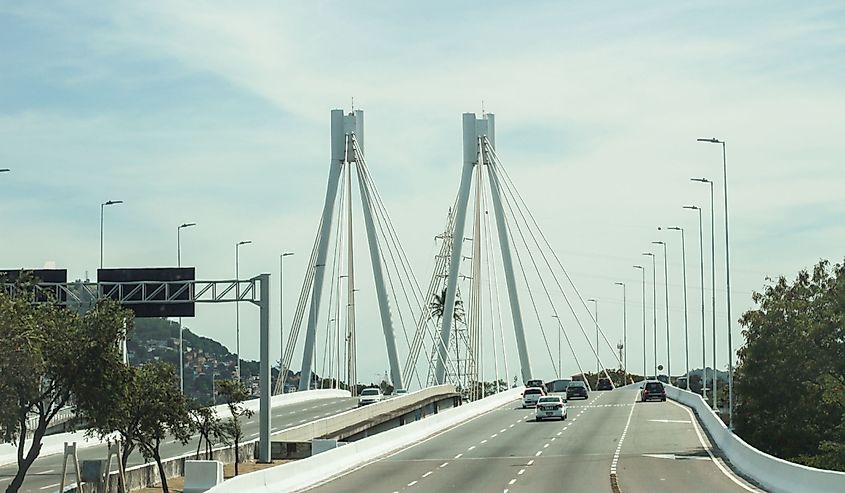
Also extending across the Paranà River is the Ayrton Senna Bridge. Named after the popular Brazilian racing driver, Ayrton Senna da Silva, this bridge has a length of about 3.6 kilometers. It has a highway that connects travelers from Guaíra in Paranà to Mundo Novo in Mato Grosso do Sul. It is close to the Rodoferroviária Rollemberg-Vuolo Bridge, but not as long as its counterpart.
Plans to build the Ayrton Senna Bridge had been in place, but construction did not commence until 1994. The bridge was commissioned in 1997. By 1998, the bridge became accessible to the public. It has been functioning ever since. Travelers who want to get into Mato Grosso do Sul faster could take this bridge, as it is shorter than most other connecting bridges.
9. Rio Negro Bridge - 2.24 miles

Brazil sure has a lot of unique bridges. Number 9 on our list is another wonder lying in the state of Amazonas in Northwestern Brazil. The Rio Negro Bridge was opened in October 2011 after four years of construction. The entire construction cost just over one billion Brazilian reals. The bridge connects the city of Manaus to the town of Iranduba. Another fantastic feature of this wonder is its 185-meter-long central mast, which gives it a distinctive look.
The Rio Negro Bridge contributes heavily to the development of the city of Iranduba because it is easier to export its products to other parts of Brazil. Its clearance level of 55 meters allows for the passage of ferries on the Amazon River below it. Tourists can take ferry rides across the river to catch a good look at the bridge or get a ride across it to get a feel for it.
10. Third Bridge - 2.05 miles
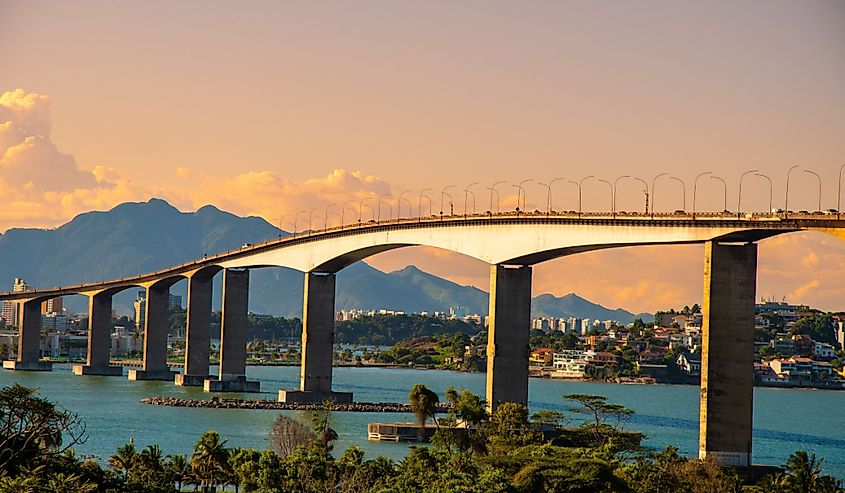
The Third Bridge, or Deputy Darcy Castelo de Mendonça Bridge, is a steel-and-concrete bridge in Brazil. Right in Espirito Santo, the bridge connects the Vila Velha and Vitória cities. Though this bridge is tenth on the list, it conveniently occupies the position of the second tallest bridge in Brazil, with a height of 70 meters. Ferries can conveniently move below the bridge. The bridge's construction was completed in eleven (11) years, and today, it records a daily movement of over 58,000 cars.
The bridge carries a whopping 15 lanes, each measuring 3.3 kilometers. This means up to seven cars can drive side-by-side on it from Vitória to Vila Velha. Tourists visiting places like the Penha Convent can take the route of the Third Bridge to get there. The bridge also gives tourists a good view of Vitória's Bay.
11. Pumarejo Bridge - 1.9 miles

The Pumarejo Bridge is the last on the list. Sitting across the Magdalena River, this bridge has a length of 3.2 kilometers. It links the river and the Salamanca Island Road Park with the eastern parts of Colombia. It is the second-longest bridge in Colombia, behind only the Viaducto Del Manglar. It is a road bridge with a highway with six (6) lanes for cars and others for bikes and walkways. This makes it the longest road bridge in Colombia.
The Pumarejo Bridge was constructed between 2012 and 2019 to replace the old Laureano Gómez Bridge. It also serves as a good observation point for the old one since it was only closed up and not demolished. Its clearance level of 45m allows bigger ships into the ports surrounding the Magdalena River. So, ship tourists can get a panoramic view of the bridge. This bridge may not be as long as others, but it is one of the wonders of Colombia.
Conclusion
Bridges are not just solid and massive; they are fascinating, too. Their construction's aesthetics and ability to withstand the test of time keep everyone in awe. While some are recent, many have been constructed since the mid-20th century and still dominate the atmosphere. South America has a lot of bridges, and these top eleven are proof of the fascinating nature of the continent. Visitors will find world-class road bridges, rail bridges, and viaducts surrounded by oceans and lakes in South America.
Below is a more comprehensive table of the longest bridges in South America.
| Rank | Bridge Name | Location | Length (miles) | Length (kilometers) |
|---|---|---|---|---|
|
1 |
Lima Metro Line 1 |
Peru |
20.5 |
33 |
|
2 |
Rio–Niterói Bridge |
Brazil |
8.27 |
13.3 |
|
3 |
Rosario-Victoria Bridge |
Argentina |
7.64 |
12.3 |
|
4 |
General Rafael Urdaneta Bridge |
Venezuela |
5.4 |
8.7 |
|
5 |
Libertador General San Martín Bridge |
Uruguay |
3.36 |
5.4 |
|
6 |
Viaducto Del Manglar |
Colombia |
3.3 |
5.3 |
|
7 |
Rodoferroviária Rollemberg-Vuolo Bridge |
Brazil |
2.3 |
3.7 |
|
8 |
Ayrton Senna Bridge |
Brazil |
2.24 |
3.6 |
|
9 |
Rio Negro Bridge |
Brazil |
2.24 |
3.6 |
|
10 |
Third Bridge |
Brazil |
2.05 |
3.3 |
|
11 |
Pumarejo Bridge |
Colombia |
1.9 |
3.2 |
|
12 |
Second Orinoco Crossing (Orinoquia Bridge) |
Venezuela |
1.9 |
3.2 |
|
13 |
Eurico Gaspar Dutra Bridge |
Brazil |
1.74 |
2.8 |
|
14 |
Chacao Channel Bridge |
Chile |
1.6 |
2.6 |
|
15 |
Héroes del Chaco Bridge |
Paraguay |
1.6 |
2.6 |
|
16 |
Puente Maurício Joppert |
Brazil |
1.5 |
2.5 |
|
17 |
Avenida San Roque Gonzalez de Santa Cruz |
Argentina |
1.5 |
2.5 |
|
18 |
International Bridge Colón |
Argentina |
1.43 |
2.3 |
|
19 |
Juan Pablo II Bridge |
Chile |
1.43 |
2.3 |
|
20 |
Bridge Baron Mauá |
Brazil |
1.3 |
2.1 |
|
21 |
General Belgrano Bridge |
Argentina |
1.1 |
1.7 |
|
22 |
Juscelino Kubitschek Bridge |
Brazil |
0.7 |
1.2 |
|
23 |
Octavio Frias De Oliveira Bridge |
Brazil |
0.56 |
0.9 |
|
24 |
Angostura Bridge |
Venezuela |
0.4 |
0.7 |
|
25 |
César Gaviria Trujillo Viaduct |
Colombia |
0.25 |
0.4 |











